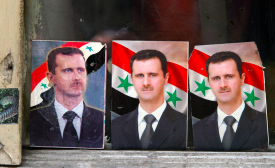conflict
Colombian President Juan Manuel Santos has said he was ready to start negotiating peace with the country's second-largest rebel group, the National Liberation Army (ELN), "as soon as possible". The announcement comes a day after the ELN released a Canadian hostage it had been holding for months, Gernot Wober. Santos hailed the rebels' release and said "the government is ready to start a dialogue with the ELN as soon as possible," in a statement released by his office on Thursday.
"Quick, run, run," shouts Kurdish commander Roshna Akeed, as she orders two young female fighters to move toward a brick wall that represents the front line between Kurdish forces and al Qaeda-linked militants in this northern Syrian town. Six male Kurdish fighters are already guarding this part of the front. They have removed some of the bricks from the five foot-high wall, and their guns peak through small holes toward the enemy, which is positioned in a hamlet roughly one-third of a mile away.
In the past week, social media masses have swiftly begun to unleash their ire with user generated content poking fun at the big players in the Syrian conflict. Social media users were torn between those who mocked Assad for getting the cold shoulder treatment by Russian’s Putin, whilst others channeled their creativity to portray that Assad is a victim of a global conspiracy.
The Paraguayan Army has deployed some 400 troops from its 4th Infantry Division to three northern regions — Concepción, San Pedro and Amambay — to hunt down the members of a shadowy insurgent movement, the Paraguayan People’s Army (Ejército del Pueblo Paraguayo; EPP for short). The group stands accused of killing four guards at a cattle ranch and a police officer in San Pedro; the attack came days after Horacio Cartes was inaugurated as Paraguay’s new head of state on August 15. The EPP, it seems, wanted to waste no time in giving him a bloody welcome.
As calls for military action in Syria grow louder some people are pointing to NATO'S 1999 intervention in Kosovo as a model. However others say the Kosovo model should not be applied to Syria as it's a different conflict and military intervention would be a bad idea. So where may the answers to ending the Syrian conflict lie?
As a committed advocate for soft power and public diplomacy, I look for ways other than military force to address even the most pernicious international behavior. Usually, talking is better than fighting and wise use of political power can make unnecessary the reliance on “kinetic action,” as military thinkers refer to combat. But there are times when a state’s actions are so outrageous and have so little chance of being altered by peaceful means that soft power measures should be set aside. On occasion, blowing things up is essential.

As a committed advocate for soft power and public diplomacy, I look for ways other than military force to address even the most pernicious international behavior. Usually, talking is better than fighting and wise use of political power can make unnecessary the reliance on “kinetic action,” as military thinkers refer to combat.
But there are times when a state’s actions are so outrageous and have so little chance of being altered by peaceful means that soft power measures should be set aside. On occasion, blowing things up is essential.
Syria warned the United States against any military action over a suspected chemical weapons attack in its civil war, saying it would "create a ball of fire that will inflame the Middle East". President Bashar al-Assad's closest ally Iran also said Washington should not cross the "red line" on Syria, where doctors accused his forces of a poison gas attack that killed hundreds last week.







